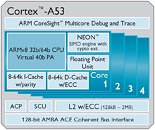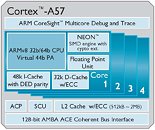- Joined
- Dec 6, 2011
- Messages
- 4,784 (0.99/day)
- Location
- Still on the East Side
ARM announced the new ARM Cortex-A50 processor series based upon the ARMv8 architecture, extending ARM's leadership in performance and low power. The series initially includes the Cortex-A53 and Cortex-A57 processors and introduces a new, energy-efficient 64-bit processing technology, as well as extending existing 32-bit processing. The scalability of the processor series enables ARM partners to create system-on-chips (SoCs) that address diverse markets, from smartphones through to high-performance servers.
The processors launched today will continue the evolution of the mobile computing experience by delivering up to three times the performance of today's superphones and extending today's superphone experience to entry-level smartphones. With a comprehensive set of ARM and ARM partner development tools and simulation models already available to enable faster and easier software development, both processors are fully compatible with the extensive ARM 32-bit ecosystem and integral to the rapidly evolving ARM 64-bit ecosystem.


The Cortex-A57 is ARM's most advanced high-performance applications processor, while the Cortex-A53 is the most power-efficient ARM application processor. The Cortex-A53 is also the world's smallest 64-bit processor. They can operate independently or be combined into an ARM big.LITTLE processor configuration, combining high performance with power efficiency. Both are supported by the ARM CoreLink 400 and new CoreLink 500 series system IP fabric solutions.
ARM partners can scale SoC platforms from single- and multi-core big.LITTLE mobile solutions to massively parallel enterprise solutions for optimal flexibility and energy-efficiency. The Cortex-A57 and Cortex-A53 processors will target multi-GHz performance on advanced CMOS and FinFET processes technologies, which is supported by early availability of ARM Artisan Physical IP and ARM POP IP for core-hardening acceleration.
Announced licensees of the new processor series include AMD, Broadcom, Calxeda, HiSilicon, Samsung and STMicroelectronics. Supporting materials and quotes from ARM partners can be found at this link and at http://www.youtube.com/ARMflix
"Consumers expect a personalized mobile experience, integrating their daily lives, with seamless connectivity providing access to vast amounts of information. The ARM ecosystem will continue its rate of unprecedented innovation to enable diverse platforms. This will deliver an era of transformational computing, from mobile through to the infrastructure and servers that support consumers' connected, mobile lifestyles. This will create massive opportunities for market expansion and a revolution in user experiences," said Simon Segars, executive vice president, processor and physical IP divisions, ARM.
As smartphones and tablets have become our primary compute devices, mobile performance and capabilities have evolved to drive the computing landscape. In the past five years, the ARM ecosystem has driven a 15x increase in the performance of smartphones, enabling a transformation in how people use their devices. The capabilities of the Cortex-A50 processor series allow it to seamlessly transition from a 32-bit to a 64-bit execution state, enabling today's existing applications, and provides scalability to 64-bit for mobile computing client evolution and future superphone trends.
Data Explosion
The evolution of mobile computing is redefining the infrastructure that drives cloud services and network connectivity. The explosive growth of smart mobile devices, combined with richness of services available to end users, is causing an increase in content generation and consumption. With data consumption predicted to reach 120 Exabytes by 2020 (eight times more than today i), the seamless mobile lifestyle will create a significant strain on network and data centre infrastructure if companies continue to deploy incumbent technologies. The Cortex-A50 processor series is designed with this new era of 'transformational computing' in mind, as well as providing an energy-efficient solution to future infrastructure needs. The enhanced 32-bit execution capability will benefit existing 32-bit cloud server applications, while 64-bit execution extends the applicability of ARM technology-based solutions to enable new opportunities in networking, server and high-performance computing.
ARM Cortex-A50 processor series:
● Currently includes the Cortex-A57 and Cortex-A53 processors
● Optional cryptographic acceleration that can speed up authentication software up to x10
● Interoperability with ARM Mali graphics processor family for GPU compute applications
● Features AMBA system coherency to extend to many-core coherence with ARM CoreLink cache coherent fabric components, including the CCI-400 and CCN-504
ARM Cortex-A57 processor:
● The most advanced, highest single-thread performance ARM application processor
● Delivers the enhanced performance required for smartphones as they continue to transition from content-consumption devices to content-creation devices, with up to three times that of today's superphones in the same power budget
● Provides computer performance comparable to a legacy PC, while operating in a mobile power budget, enabling cost and power efficiency benefits for both enterprise users and consumers
● Extended reliability and scalability features for high-performance enterprise applications
ARM Cortex-A53 processor:
● The most efficient ARM application processor ever, delivering today's superphone experience while using a quarter of the power
● Incorporates reliability features that enable scalable dataplane applications to maximize performance per mm2 and performance per mW
● Optimized for throughput processing for modest per thread compute applications
● The Cortex-A53 processor combined with the Cortex-A57 and big.LITTLE processing technology will enable platforms with extreme performance range while radically reducing the energy consumption
ARM and members of the ARM Connected Community are collaborating to develop a robust 64-bit software ecosystem. The ARM Compiler and ARM Fast Models have supported the ARMv8 architecture since it was announced in October 2011, and are used extensively by public launch licensees of the Cortex-A50 processor series. This functionality is now complemented with support for bare metal and Linux debug in the ARM Development Studio 5 (DS-5). In addition, open source operating systems, applications and third-party tools are already in development. This is a natural extension to the broad ecosystem already in place that supports existing ARMv7 architecture-based devices.
Availability: The ARM partnership is expected to ship Cortex-A50 series-based chips in 2014. ARMv8 open source operating system, toolchains and foundation models are now available at www.arm.com/products/processors/instruction-set-architectures/armv8-architecture.php.
View at TechPowerUp Main Site
The processors launched today will continue the evolution of the mobile computing experience by delivering up to three times the performance of today's superphones and extending today's superphone experience to entry-level smartphones. With a comprehensive set of ARM and ARM partner development tools and simulation models already available to enable faster and easier software development, both processors are fully compatible with the extensive ARM 32-bit ecosystem and integral to the rapidly evolving ARM 64-bit ecosystem.


The Cortex-A57 is ARM's most advanced high-performance applications processor, while the Cortex-A53 is the most power-efficient ARM application processor. The Cortex-A53 is also the world's smallest 64-bit processor. They can operate independently or be combined into an ARM big.LITTLE processor configuration, combining high performance with power efficiency. Both are supported by the ARM CoreLink 400 and new CoreLink 500 series system IP fabric solutions.
ARM partners can scale SoC platforms from single- and multi-core big.LITTLE mobile solutions to massively parallel enterprise solutions for optimal flexibility and energy-efficiency. The Cortex-A57 and Cortex-A53 processors will target multi-GHz performance on advanced CMOS and FinFET processes technologies, which is supported by early availability of ARM Artisan Physical IP and ARM POP IP for core-hardening acceleration.
Announced licensees of the new processor series include AMD, Broadcom, Calxeda, HiSilicon, Samsung and STMicroelectronics. Supporting materials and quotes from ARM partners can be found at this link and at http://www.youtube.com/ARMflix
"Consumers expect a personalized mobile experience, integrating their daily lives, with seamless connectivity providing access to vast amounts of information. The ARM ecosystem will continue its rate of unprecedented innovation to enable diverse platforms. This will deliver an era of transformational computing, from mobile through to the infrastructure and servers that support consumers' connected, mobile lifestyles. This will create massive opportunities for market expansion and a revolution in user experiences," said Simon Segars, executive vice president, processor and physical IP divisions, ARM.
As smartphones and tablets have become our primary compute devices, mobile performance and capabilities have evolved to drive the computing landscape. In the past five years, the ARM ecosystem has driven a 15x increase in the performance of smartphones, enabling a transformation in how people use their devices. The capabilities of the Cortex-A50 processor series allow it to seamlessly transition from a 32-bit to a 64-bit execution state, enabling today's existing applications, and provides scalability to 64-bit for mobile computing client evolution and future superphone trends.
Data Explosion
The evolution of mobile computing is redefining the infrastructure that drives cloud services and network connectivity. The explosive growth of smart mobile devices, combined with richness of services available to end users, is causing an increase in content generation and consumption. With data consumption predicted to reach 120 Exabytes by 2020 (eight times more than today i), the seamless mobile lifestyle will create a significant strain on network and data centre infrastructure if companies continue to deploy incumbent technologies. The Cortex-A50 processor series is designed with this new era of 'transformational computing' in mind, as well as providing an energy-efficient solution to future infrastructure needs. The enhanced 32-bit execution capability will benefit existing 32-bit cloud server applications, while 64-bit execution extends the applicability of ARM technology-based solutions to enable new opportunities in networking, server and high-performance computing.
ARM Cortex-A50 processor series:
● Currently includes the Cortex-A57 and Cortex-A53 processors
● Optional cryptographic acceleration that can speed up authentication software up to x10
● Interoperability with ARM Mali graphics processor family for GPU compute applications
● Features AMBA system coherency to extend to many-core coherence with ARM CoreLink cache coherent fabric components, including the CCI-400 and CCN-504
ARM Cortex-A57 processor:
● The most advanced, highest single-thread performance ARM application processor
● Delivers the enhanced performance required for smartphones as they continue to transition from content-consumption devices to content-creation devices, with up to three times that of today's superphones in the same power budget
● Provides computer performance comparable to a legacy PC, while operating in a mobile power budget, enabling cost and power efficiency benefits for both enterprise users and consumers
● Extended reliability and scalability features for high-performance enterprise applications
ARM Cortex-A53 processor:
● The most efficient ARM application processor ever, delivering today's superphone experience while using a quarter of the power
● Incorporates reliability features that enable scalable dataplane applications to maximize performance per mm2 and performance per mW
● Optimized for throughput processing for modest per thread compute applications
● The Cortex-A53 processor combined with the Cortex-A57 and big.LITTLE processing technology will enable platforms with extreme performance range while radically reducing the energy consumption
ARM and members of the ARM Connected Community are collaborating to develop a robust 64-bit software ecosystem. The ARM Compiler and ARM Fast Models have supported the ARMv8 architecture since it was announced in October 2011, and are used extensively by public launch licensees of the Cortex-A50 processor series. This functionality is now complemented with support for bare metal and Linux debug in the ARM Development Studio 5 (DS-5). In addition, open source operating systems, applications and third-party tools are already in development. This is a natural extension to the broad ecosystem already in place that supports existing ARMv7 architecture-based devices.
Availability: The ARM partnership is expected to ship Cortex-A50 series-based chips in 2014. ARMv8 open source operating system, toolchains and foundation models are now available at www.arm.com/products/processors/instruction-set-architectures/armv8-architecture.php.
View at TechPowerUp Main Site
Last edited:






